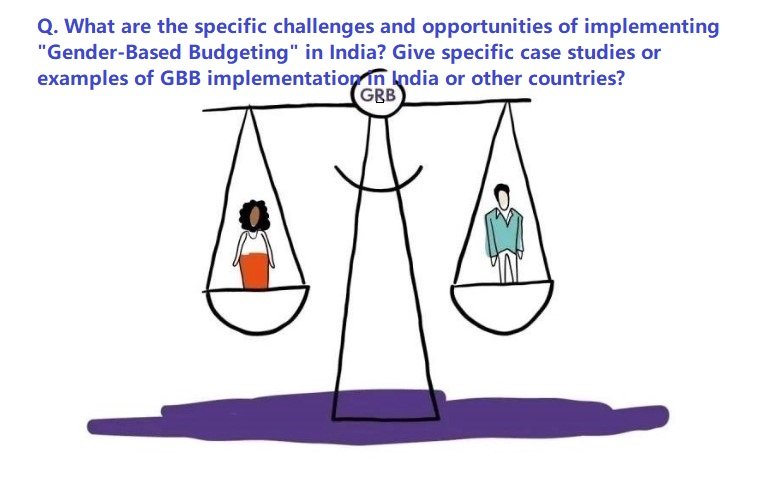AWIP, Economics, GS P6 (Economy, Geography, Environment...)
Q. What are the specific challenges and opportunities of implementing “Gender-Based Budgeting” in India? Give specific case studies or examples of GBB implementation in India or other countries?
Gender-based budgeting (GBB) is a strategic approach to public finance that integrates gender perspectives into the entire budget cycle. It involves analyzing how budget allocations impact women and men differently, and then reallocating resources to promote gender equality. The goal is to ensure that budgets contribute to a more equitable society.
Challenges
Implementing GBB in India comes with its own set of challenges:
- Data Availability: Accurate and disaggregated data on gender is crucial for effective GBB. India faces challenges in collecting and analyzing such data, especially at the grassroots level.
- Capacity Building: Government officials and policymakers need adequate training and capacity building to understand gender issues and incorporate them into the budgeting process.
- Political Will: Strong political commitment is essential for successful GBB implementation. It requires a shift in mindset and prioritization of gender equality.
- Social Norms: Deep-rooted gender stereotypes and biases can hinder the effective implementation of GBB. Changing societal attitudes towards gender roles is a long-term process.
- Resource Constraints: Limited financial resources can be a challenge in allocating sufficient funds for gender-specific programs and projects.
Opportunities
Despite the challenges, GBB also presents significant opportunities for India:
- Empowering Women: GBB can be a powerful tool to empower women by addressing their specific needs and priorities.
- Inclusive Development: By focusing on gender equality, GBB can contribute to more inclusive and sustainable development.
- Improved Governance: GBB can enhance transparency and accountability in public spending by ensuring that resources reach the intended beneficiaries.
- Learning and Innovation: India can become a leader in GBB implementation by sharing its experiences and best practices with other countries.
- Public Awareness: GBB can raise awareness about gender issues and mobilize public support for gender equality.
Overcoming Challenges and Maximizing Opportunities
To overcome these challenges and maximize the opportunities offered by GBB, India can take the following steps:
- Strengthen Data Collection and Analysis: Invest in improving data collection systems and building capacity for data analysis.
- Capacity Building: Provide comprehensive training to government officials, policymakers, and civil society organizations on gender budgeting.
- Political Leadership: Ensure strong political commitment to gender equality and GBB.
- Public Awareness Campaigns: Conduct widespread public awareness campaigns to challenge gender stereotypes and promote gender equality.
- Partnerships: Collaborate with civil society organizations, women’s groups, and international development partners to strengthen GBB implementation.
By addressing these challenges and leveraging the opportunities, India can make significant progress towards gender equality and inclusive development through gender-based budgeting.
Case Studies in Gender-Based Budgeting
India: A Glimpse into the Future
While India is still in the early stages of full-fledged GBB implementation, there are promising initiatives:
- Kerala’s Kudumbashree Project: This poverty alleviation program has a strong gender focus. While not explicitly GBB, it demonstrates the potential of gender-sensitive budgeting. The project has empowered women through microfinance, skill development, and community-based initiatives, leading to improved livelihoods and social indicators.
- NITI Aayog’s Women Entrepreneurship Platform (WEP): This initiative focuses on creating an ecosystem for women entrepreneurs. While not directly a budgeting exercise, it aligns with GBB principles by identifying and addressing barriers faced by women entrepreneurs.
International Best Practices
Several countries have made significant strides in GBB:
- South Africa: Known for its progressive gender policies, South Africa has integrated GBB into its budgeting process. They have allocated specific funds for women’s economic empowerment, health, and education.
- Canada: Canada has been a pioneer in GBB. They have developed a comprehensive framework for gender-based analysis and have successfully integrated it into various budget cycles.
- Australia: The Australian government has implemented GBB to address gender disparities in areas like health, education, and employment. They have also developed tools and resources to support GBB implementation.
Key Lessons Learned
- Data is Crucial: Accurate and disaggregated data is essential for identifying gender gaps and allocating resources effectively.
- Capacity Building: Investing in training and capacity building for government officials is crucial for successful GBB implementation.
- Political Commitment: Strong political will is essential to drive GBB initiatives forward.
- Multi-Stakeholder Partnerships: Collaboration between government, civil society, and the private sector is vital for effective GBB.
- Monitoring and Evaluation: Regular monitoring and evaluation are necessary to track progress and make adjustments as needed.
GBB is a powerful tool that can help the country harness the full potential of its female population and build a more prosperous and equitable future.


